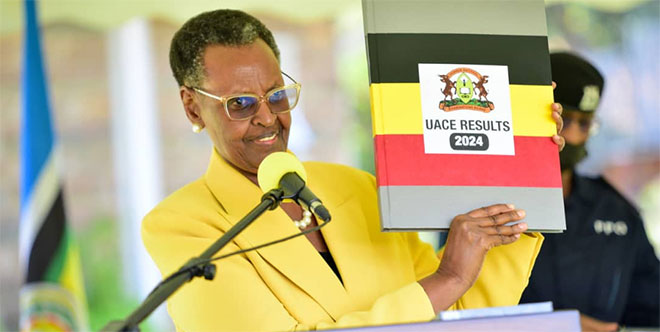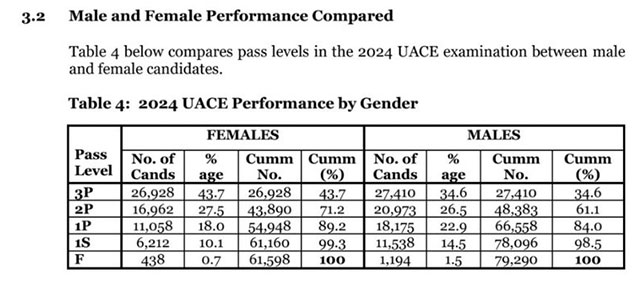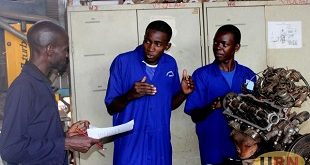
Performance of candidates has shown significant improvement in Economics, Literature in English, Physics, and Biology.
Kampala, Uganda | LOUIS JADWONG & UNEB MEDIA | A level candidates offering Ugandan local languages have performed poorly according to the latest national A Level results released today by First Lady and Minister of Education and Sports, Janet Museveni.
“UNEB examines a number of local languages at this level. Candidates offering these languages showed a lack of knowledge of cultural practices, meanings of proverbs, and use of the proverbs in sentences; lack of appropriate vocabulary to write meaningful translations and compositions,” said Dan Odongo, the Executive Director Uganda National Examinations board (UNEB).
The local language subjects offered at A level are Luganda, Acholi, Lango, Lugbara, Runyakore/Rukiga , Ateso, Lusoga, Dhopadhola, Runyoro/Rutooro and Lumasaaba. UNEB did not however give details of the results.
Odongo also highlighted declining performances in the Sciences and a few arts subjects. He said there are significant drops in levels of performance in Entrepreneurship Education, Christian Religious Education, Geography, Mathematics, Agriculture, and Chemistry.
“The general problems of inadequate practical exposure continue to impact performance. Many candidates could not describe experimental procedures and failed to interpret the experimental setup from the diagrams given in the question paper, especially in physics. Some candidates gave results from experiments without showing how they were obtained. There is also the challenge of relating science concepts to real-life situations.”
Dan Odongo was speaking today at State House Nakasero as UNEB handed First Lady Janet Museveni the results for release.
EXAMINATION MALPRACTICE
Cases of malpractice at this level have remained low. In accordance with Section 5(2) (b) of the UNEB Act, Cap 259, those results will be
withheld, pending completion of investigations. Cases were reported from 38 centres out of the 2,255 centres.… pic.twitter.com/J2X3X8hJWE— Uganda National Examinations Board (@UNEB_UG) March 14, 2025
He explained that in the Humanities, “the problems continue to be poor interpretation of questions due to misunderstanding of the key concepts that determine the expected responses.”
“In history, for example, inadequate critical thinking skills limited candidates’ ability to analyse historical views. The National Constitution is a major reference material in one of the papers in the subject. Candidates who offered this paper exhibited limited exposure to the Constitution.”
He noted however that the performance of candidates has shown significant improvements in economics, literature in English, physics, and biology.
65.5% of students qualify to be admitted to University
A total of 141,996 candidates registered for the 2024 UACE examination compared to 110,566 candidates in 2023; an increase of 31,4430 candidates (28.4%). This is a significant increase in candidature compared to previous years.
Of these, 61,957 (43.6%) were females, and 80, 039 (56.4%) were males. Males also accounted for 53.1% (16,695) of the increased candidature.
He said that since university admissions to degree courses have been 2 Principal level passes, 92,273 (65.5%) of those who sat the exams in 2024 qualify to be admitted, compared to 80,816 (73.8%) in 2023. He warned that an extra 11,457 university places are now needed.
Janet Museveni, the Minister of Education, reassured parents and the general public that the government has laid a strong foundation to ensure there is adequate capacity to accommodate learners wishing to pursue higher education at the university level, as well as those seeking opportunities at other TVET institutions, both public and private.
Maths on the up
The UNEB ED revealed that the number of candidates registering and appearing for Mathematics and the Sciences are gradually increasing. Mathematics has the largest increase. However, overall, the numbers have remained well below half of the total candidature. The low pass rates in Sciences at the UCE level probably explain the low numbers transitioning to UACE level for those subjects, he said.

Proportionally, female candidates performed better than their male counterparts at the principal level pass (A-E) in all the humanity subjects, Physics and General Paper. Female candidates, although fewer in number than the male candidates, have performed proportionally better than their male counterparts. The percentage passes at the upper levels (3P and 2P) are higher, while percentage passes at the lower levels and failure rate among female candidates are lower than for the males.
“This is a trend that we have observed over the years. Female entries for the Sciences and Mathematics have remained lower than that of the males, consistent with the fact that overall female entry is lower than that of the males. The numbers are, however, rising as well,” Odongo remarked.
UCE New Curriculum blues – RESULT 1
Prof Celestino Obua, the UNEB chairperson, acknowledged concerns raised by some stakeholders about the grading of UCE under the competency based new curriculum.
“We have taken cognizance of the confusion created by Result 1, which was misinterpreted as Grade 1. We also note that the Ministry of Education and Sports has been put under pressure to put numerical values to the Grades A-E,” said Prof Obua.
He added that, “The Board recognizes that these concerns are understandable and occur with any change of such a magnitude as the new curriculum. The Board has planned a series of engagements with critical stakeholders to explain the grading system. The Board will not put numerical values to these grades as we hear has been agitated for, because that is not the intention of the new curriculum.”
 The Independent Uganda: You get the Truth we Pay the Price
The Independent Uganda: You get the Truth we Pay the Price




God bless our children next results